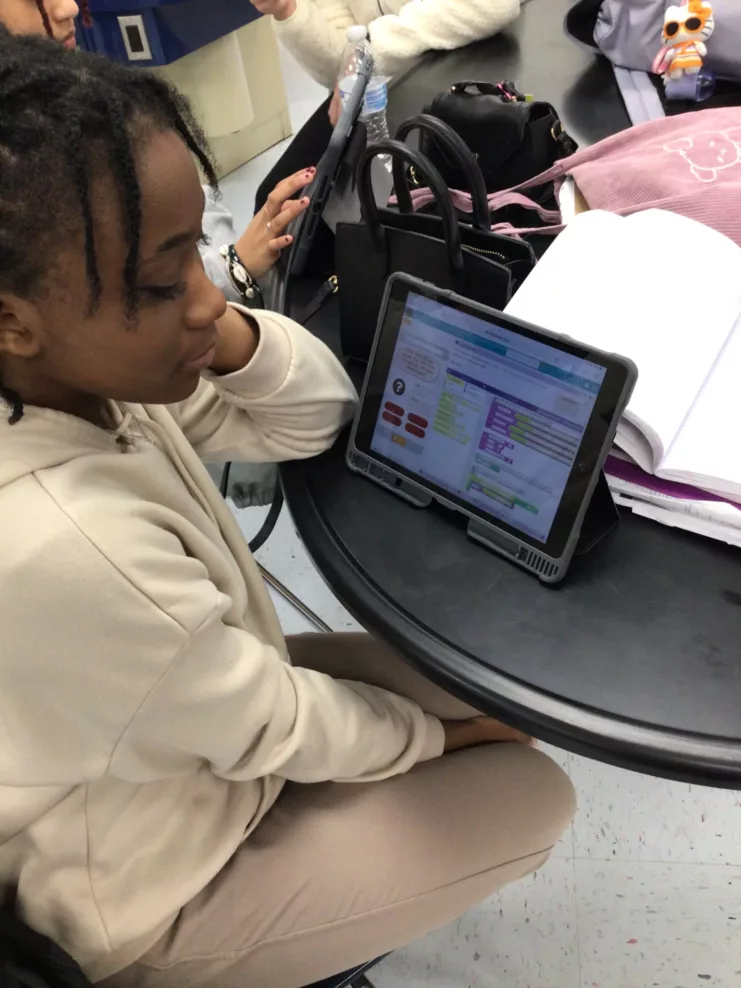Educating America’s Future Problem-Solvers

- To expand access for students and teachers to the skills and training needed for the 21st century, Griffin Catalyst is partnering with educators, schools, policymakers, and researchers to bring data literacy, computer science, and problem-solving skills to a far wider group of students across the country.
- This includes efforts to expand access to data science and computer science instruction nationally, through partnerships with Data Science 4 Everyone, a national coalition founded by University of Chicago professor and “Freakonomics” co-author Steven D. Levitt, and through the Kenneth C. Griffin CS Education for All Initiative, which aims to train the next generation of computer science teachers.
- Griffin Catalyst has also worked to expand access to the Advanced Placement (AP) Computer Science Principles course with the College Board to bring the introductory course to students of all backgrounds at 500 new schools across the country.
The ability to harness the power of data is of great importance to our country’s competitiveness and future success.
Data Science 4 Everyone
One evening in late 2018, Steven D. Levitt found himself undertaking a familiar and frustrating ritual: helping one of his children with high school math homework. As the father of four teenagers, Levitt—the celebrated University of Chicago economics professor who co-authored the bestseller “Freakonomics”—had been through the dispiriting routine before. This time his daughter Sophie, a sophomore, was being asked to solve an algebra problem: “Rationalize the denominator in the equation: 3 over the square root of X minus 7.”
Levitt himself loved math and used it all the time in his work. But he was convinced that the math curriculum Sophie was being taught, from a similar syllabus his own teachers had used decades before—and that had been devised many decades before that—needed to be significantly updated to include more relevant kinds of mathematics, statistics, and data science.

There are few abilities more valuable in the modern world, Levitt believed, than what he called “data fluency.” By this he meant a basic comfort with data, an understanding of the difference between correlation and causality, the capacity to evaluate claims that others make with data and, ideally, even the ability to take what he called “a pile of data” and make sense out of it.

The need for this kind of literacy is urgent—and growing more so every year. Even as data-oriented careers increase by 35% annually in the United States, nearly two-thirds of American companies struggle to find data-literate employees. In recent years, data literacy has become crucial to our ability to make intelligent decisions about health care, climate issues, and a growing number of public policies and consumer and business decisions. Even cars, Levitt points out, are now essentially sources of data, requiring data fluency among auto mechanics.

Data is the fuel behind so many emerging technologies and artificial intelligence and blockchain and also is, increasingly, an aspect of every career, every sector.
Yet most students, Levitt knew, are barely exposed to data at all. Only 10% of American high school students take a statistics class, and the courses they do take are largely theoretical rather than ones requiring students to delve deeply into working with data.
The widespread lack, Levitt argued, was becoming a threat to global competitiveness, noting that “there are other countries that are doing this much better than the United States.” A greater focus on data in the high school math curriculum, he believed, would enhance the student experience as well.
The beauty of data science is it applies mathematical scientific tools in whatever context is of interest to the student. You can meet students exactly where they are. And that is something you can't do easily with almost any of the other math subjects that we teach in high school.
In 2019, Levitt devoted his “Freakonomics” podcast to the subject, arguing for a more central place for data science in the high school curriculum. “The podcast came out, and it went viral, and we had literally hundreds of teachers, school leaders, charter school networks calling us,” recalls Zarek Drozda. “The governor of Mississippi, at one point, called us, trying to see how they could bring data science to their state.”
Levitt clearly wasn’t alone in his conviction about the importance of high school data-science courses. “There was an enormous thirst for this,” he observes, “and it’s a thirst that pervades the universities, the parents, the students—even the math teachers, I believe.” At least a dozen disparate groups around the country had been working on the same problem for years, but their individual efforts had made limited headway.
The solution was to combine forces through a new national coalition, Data Science 4 Everyone. Based at the University of Chicago, the coalition works toward the widespread adoption of data science in K-12 curricula, aiming to make data literacy a graduation requirement for every student in the country.
To help bring their vision to reality, Griffin Catalyst, in partnership with Schmidt Futures, the Siegel Family Endowment, and the Valhalla Foundation, announced their support in June 2021.
Griffin Catalyst’s support has allowed the coalition to become a sustainable organization with full-time staff dedicated to advancing this work nationally and enabled pilot programs to support new data science programs in school districts around the country.

Data Science Is Growing Across the Country
Recognizing the nationwide need for data literacy to empower the United States to compete globally, the coalition is engaging math education leaders and state boards of education around the country—the very people who write the standards–to better respond to 21st century education needs. It is now working with 20 states to create data science courses and programs, a solid start for its national ambitions.

As Drozda put it, “We want to hit all 50 states, and we want to make sure that every student in every classroom can learn digital skills that are relevant for real life, for modern careers. And of course, there is a tidal wave of emerging technology that’s still on the way: artificial intelligence, quantum computing, blockchain, Web 3.0, metaverse. The list goes on and on. We want students to be able to have confidence that they can build that world and not just respond to it.”

One of the first challenges to achieving this broad vision for access to data science: Over half the schools in the country have no teacher with any experience in data science, nor any resources to create a course or train an existing teacher.
Within the space of 18 months, the coalition has become a national clearinghouse for data science resources and curricula and has seeded dozens of pilots to test different models of integrating data science in different course combinations, sequences, and pedagogies. In all, it has helped bring about more than 270 commitments from school districts, nonprofits, and policymakers—urban, suburban, and rural alike—to expand access to data science, impacting more than three million students. “In all of the examples where data science courses have been implemented in K-12 schools,” notes Drozda, “the relevance to students is clear and immediate.”
3 Million+
Students who will receive data science education through Data Science 4 Everyone and partners based on 270 commitments from school programs across the US in its first two years
Every student in our country should have access to a world-class computer science education. Through my own experience and that of so many of my colleagues, I know firsthand that early exposure to coding can inspire a lifelong passion for problem solving and engineering.
Increasing Access to Computer Science
For Griffin Catalyst, the funding for Levitt’s coalition has been one part of a far larger commitment to bring not only data training but also computer science and critical thinking skills to a wider population.
A more recent initiative sought to address a related issue: the need to expand access to and participation in computer science education among students of all backgrounds. In February 2022, Griffin Catalyst provided funding to expand access to Advanced Placement (AP) Computer Science Principles (CSP), a foundational computer science course for high school students, introduced by College Board in 2016 with significant support from the National Science Foundation.
500
New high schools in the United States to offer the AP Computer Science Principles course

This support focused on offering, for the first time, AP Computer Science Principles in 500 schools across the country, providing new opportunities to a diverse array of students. It also provided funding for teacher professional development, mentorship opportunities, technology, and other costs associated with offering the course. Introducing high school students to the foundational concepts of computer science and challenging them to explore how technology can impact the world, the AP CSP course is providing a new pathway into computer science education for students, including those who have traditionally been underrepresented in science, technology, engineering, and math (STEM).
Research by College Board has revealed the strong potential of this work: students who take AP CSP in high school are more than three times as likely to major in computer science in college than those who did not. And the results are encouraging: the program has led to a significant increase in female and minority students taking AP Computer Science Principles coursework and exams.
3X
Higher likelihood that students who take AP Computer Science Principles in high school will major in computer science in college compared to those who don’t take AP CSP
Increasing the number of computer-science high school classes, of course, means increasing the number of computer science high school teachers, who themselves have to be trained.
In November 2022, Griffin Catalyst provided $5 million in support to tackle this challenge, funding a new initiative at the University of Florida, the Kenneth C. Griffin CS Education for All Initiative, to address the dire lack of computer science training in America’s colleges. Among the country’s more than 800 colleges, there are only a handful of faculty members in computer science education. As a result, far too few K-12 teachers enter the classroom prepared to teach computer science or to integrate the subject into their instruction.
Griffin Catalyst’s investment ensures that new teachers are prepared to teach computer science, builds the field of computer science educational research, and aims to create a pipeline of Ph.D. candidates for colleges everywhere.

Championing Critical Thinking
Data science and computer science are powerful tools for success in the 21st century, but there is something just as fundamental—if not more—that students will need to solve the most challenging problems of the future: the ability to think critically.
Griffin Catalyst recently joined the Hewlett Foundation, John D. and Catherine T. MacArthur Foundation, Gordon and Betty Moore Foundation, and Rockefeller Foundation to provide pilot funding to establish a partnership with University of California, Berkeley professor and Physics Nobel Laureate Saul Perlmutter and Nobel Prize Outreach to design, implement, and evaluate a new curriculum for high schoolers called “Scientific Thinking for All: A Toolkit.”
The partnership’s pilot project will develop, disseminate, and test a new scientific critical thinking course—expanding the teaching tools of science education to help students around the world evaluate evidence, question their analyses, think probabilistically, and solve problems patiently, optimistically, and iteratively. As it evolves, the pilot aims to expand globally, reaching educators and students in countries around the world.




